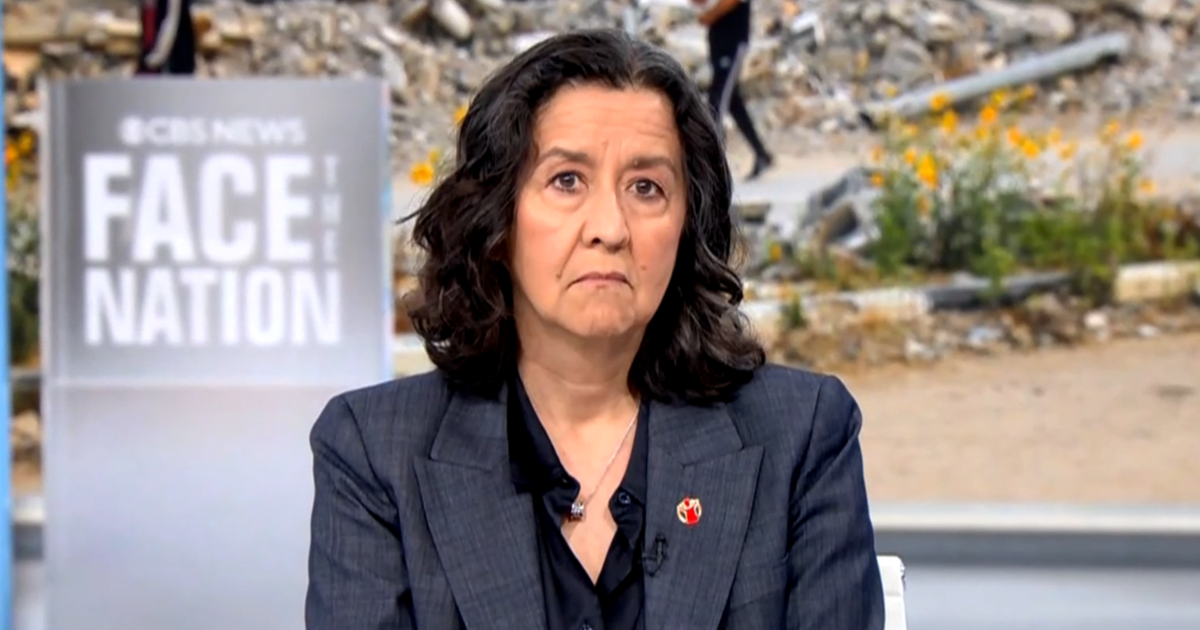On June 8, 2025, an episode of “Face the Nation” hosted by Margaret Brennan featured a compelling interview with Janti Soeripto, the CEO of Save the Children. The discussion centered around the harrowing humanitarian situation in Gaza, where a million children are facing devastating conditions due to prolonged conflict and blockade.
Margaret Brennan initiated the interview with a warm welcome and quickly moved to address the urgent situation: “So there are a million children in Gaza in desperate need. The U.N. says the 11-week Israeli blockade has caused the rate of young children suffering from acute malnutrition to triple. What are you able to get in to help?”
Janti Soeripto then explained the dire circumstances facing their aid distribution efforts: “Since March 2, Save the Children has been able to get nothing in whatsoever.” Despite the official end of the blockade, logistical and bureaucratic barriers continued to prevent their supplies from reaching those in need. “Even though the blockade is formally over, we haven’t been able to get any of the 50 trucks that we have around Gaza on the border ready to go in, we haven’t been able to get anything in,” Soeripto detailed.
Brennan pressed for reasons behind the inability to deliver aid, to which Soeripto replied, “We haven’t gotten any authorization to get them in,” pointing directly to the lack of permissions from Israeli authorities. She also highlighted efforts from the U.S. government, though she remarked, “There’s an effort. We think that those attempts currently are completely ineffective and inadequate.”
The conversation moved to an even more distressing topic when Brennan brought up a conversation with the director of Al-Shifa Hospital in Gaza, who signaled an imminent collapse of healthcare services due to a shortage of fuel for generators. Soeripto shared chilling accounts from the ground, where medical shortages were causing unimaginable suffering, including instances where children woke up during surgical procedures due to insufficient anesthetics.
The deteriorating social fabric of Gaza was also a point of concern. Soeripto illustrated, “Thousands and thousands of children have lost one or more parents… We’ll have kids, young kids, taking care of their younger siblings, trying to survive.” This loss, she asserted, is inflicting deep and possibly irreparable trauma on an entire generation.
Amid these horrific conditions, Soeripto painted a picture of resilience as she described her staff’s daily struggles. Nearly 200 Palestinian employees of Save the Children persevere, against all odds, to provide whatever aid and comfort they can to families and children. Despite facing immense personal hardships, including food shortages affecting their own families, they continue their humanitarian mission.
Furthermore, the conversation touched upon the international response, specifically critiquing a new U.S.-backed organization, the Gaza Humanitarian Foundation. According to Soeripto, this initiative, ostensibly a tool for aid delivery, has fallen short of expectations and is marred by inefficiencies and controversies, including a recent incident involving security threats which were inadequately disclosed.
“Our previous mechanism worked just fine. We got trucks and trucks of supplies in at scale. We were able to deliver. We treated children with malnutrition. We did vaccinations. We did medical care,” Soeripto emphasized, disapproving the current approach which she described as a “militarization of aid.”
Wrapping up the interview, Brennan noted the inadequate response that basic food supplies represent in the face of such vast starvation, underscoring the need for specialized nutritional and medical assistance. Janti Soeripto’s parting thoughts reinforced the grim reality and the substantial efforts still required to address the humanitarian crisis in Gaza.
Overall, the interview exposed the intense and ongoing challenges in delivering aid to Gaza. It highlighted the bureaucratic impediments, the dire medical and nutritional deficiencies, the profound societal impacts of conflict and loss, and the crucial yet often insufficient international efforts to mitigate one of the most severe humanitarian crises of the time.









